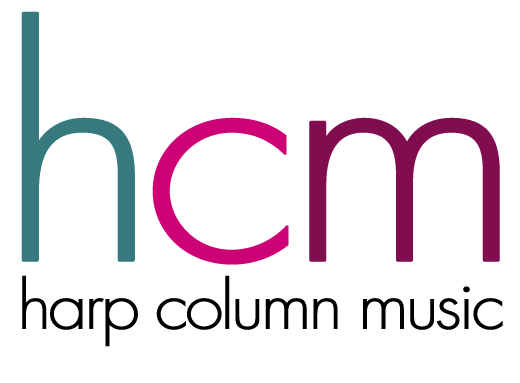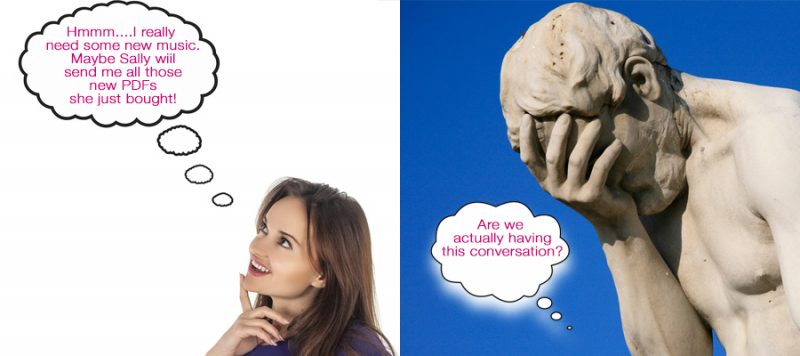Technology Tips
Is it Legal?
In my previous post, I described the process of scanning music to get it onto your iPad. Inevitably, one of the first questions I was asked on Facebook was, “Is that legal?” The answer is, this is a contentious issue, and there are no easy answers. Further complicating the issue is the fact that intellectual property (a.k.a. “copyright”) laws differ depending on your country. Since I’m from the U.S., this blog is from the perspective of the laws that apply to me.
Is scanning legal?
As I described earlier, I scanned much of my personal library to transfer to my iPad before moving overseas. And much of the standard classical music in my library is unquestionably in the public domain. Handel Concerto? Hasselmans “La Source?” Scan away. In fact, you can already find versions of public domain harp standards ready to download on sites such as IMSLP or the Brigham Young Harp Archives, saving you the trouble of doing any work at all.
The gray area comes with music that is not in the public domain. And much of the standard harp repertoire (most of the compositions by Grandjany or Salzedo for instance) falls into this category as well. If you try to find a definitive answer to the legalities of scanning—or copying, because that’s all a scan really is—music you own that is not in the public domain, for your own personal use, you’ll encounter many opinions about why this is or is not OK. According to most music publishers’ interpretations of the copyright law, it is probably not OK. There are several resources you can check out including the Music Publishers Association Copyright FAQ, and the Retail Print Music Dealers Association Copyright Info page, that attempt to summarize the nuts and bolts of the 13+ chapter US Copyright Law into laymen’s terms. And both of these organizations spell out in no uncertain wording that copying without permission “for any reason” is not OK.
But you’ll also notice that neither of these sources really answers our specific question: “Can I put music I’ve already purchased onto my iPad so I don’t have to carry 10 heavy notebooks around with me to every job?” Essentially, musicians have already been doing this for years with photocopied gig books (come on, we ALL DO IT!!!). The reality is that the print music industry simply does not address this very common scenario.
Allow me to digress for one moment. Raising further questions is the fact that much of the music you might want to put on your iPad is not available in digital form to begin with, leaving no other option but to scan. It’s kind of like if you have a cassette tape of the Grateful Dead from 1982 (guilty), but you no longer have a cassette player. (OK, it’s not exactly like that, but I’m struggling for an analogy here.) Or maybe you have a cassette player at home, but you want to listen in your car, which most certainly no longer has a cassette player. (Better analogy.) You need to get that tape onto your phone, right? The recorded music industry has at least recognized the modern issues consumers face by making every album since the beginning of time available in digital format and allowing consumers to put purchased files on multiple devices. That cassette tape was probably bootlegged to begin with anyway, so at least now you’ve actually come clean and made good on it, right? If I could pay for the convenience of purchasing a PDF of a piece I already owned to save myself the hassle of scanning it (because it is, really, a pretty big hassle), I would do it! Wouldn’t you? So, in my humble opinion, publishers really need to get with the program here, quite literally. Until they make music available in a format that consumers are demanding in a 21st-century world, they are practically begging us to keep scanning, and frankly, they are leaving money on the table.
So where does this leave us? Is it legal? Are we trying to rationalize our way around the copyright law? A good place to start is by asking yourself one extremely important question: Are you copying to avoid purchase? If so, you are unquestionably breaking the law. If not, well, let your conscience be your guide.
What about file sharing?
So by one means or another you’ve gotten some music into your Dropbox and onto your iPad. Now let’s address #4 on my list of ways to import music: Ask a friend to send you music they’ve already scanned or purchased.
Come on, you have to know this is not cool, right!!! Do we even have to go here? (facepalm!)
I’ll try not to get all preachy on you, but as anyone in the very tiny harp music industry will tell you, our market is REALLY small! Almost any piece of music you’re likely to buy was probably written, arranged, or published by someone like your teacher, or your teacher’s teacher, or a friend, or maybe even you. (OK, well you wouldn’t buy music from yourself, but you get my point.) If you share files to avoid purchase (obviously there’s no problem with sending your friend a public domain file), you are absolutely hurting and sabotaging your friends and colleagues, and our collective potential for generating new harp music becomes much smaller than it already is. There, I’ve said it.
One of the first questions artists always ask when we talk with them about selling their music on Harp Column Music is, “How are you going to prevent people from sending my PDF to all their friends?” The short answer? We can’t. We’ve included some mechanisms to make it a little harder, like our admittedly-slightly-annoying password protection system. But we didn’t exactly fall off the turnip truck yesterday. We know that any 12-year-old with a smartphone could easily circumvent this system. But at least having a password in place will cause file sharers to think twice about what they’re doing.
So is it legal?
I’ve now given you one more in a long line of pretty vague answers you can find on your own if you scour this topic on the internet like I’ve been doing for the past three days. I hope I’ve saved you the trouble! To the person who asked me “is this legal?” I can only repeat my first statement: there are no easy answers.
Do you have thoughts to add to this conversation? Please post in our comments section! We want to hear from you.





Recently I looked up the copyright laws in Germany, because I love digital sheet music (and even prefer it over printed).
It might be different in the USA, but in Germany it is illegal to scan sheet music. It doesn’t matter if you bought the printed version or why you want to scan it – it is forbidden.
It’s also not allowed to make a copy of printed sheet music (not even for yourself only).
It’s even illegal to write down the music in a digital notation software (like MuseScore, Sibelius, Finale etc.).
The only thing that is allowed is to copy sheet music by hand (!).
That means digitising (via scanning, a notation software or otherwise) is illegal. Copying via printer is also forbidden. The only allowed version is to copy the music by hand on a sheet of paper.
It’s also illegal to play an unauthorised arrangement of a music piece in public (and especially for money). That means you can’t play for example an arrangement of “Beauty and the Beast” from someone who published his private arrangement on MuseScore, because the music belongs to Disney and the composer, respectively.
Of course it is different with folk songs who don’t have a known composer. When nobody owns the rights to the original music people can arrange and play as they please.
Sometimes I read that people arrange pieces of others for money. In Germany that’s against the law. It’s illegal to make money from music that belongs to someone else. That means arranging music that belongs to another composer and selling your arrangement of his music for-profit without permission is forbidden. For example if I arrange “Beauty and the Beast” for the harp, I cannot sell this arrangement without permission from Disney and the composer, respectively.
Online music archives with scanned sheet music are great, but there’s a catch. When a composer is already dead for 70 years, it is allowed to play his compositions (at least in Germany). But the concrete notation of his music often belongs to a publisher. So it is possible that this publishing company still holds the rights for this specific notation. The notation/ editing/ arranging is their intellectual property. That means you have to have their permission to play this arrangement (digital or not).
To add to that I’m not sure if it’s legal to use the scanned sheet music from an online music archive in public (and again especially for money). I would first make sure not to infringe someone’s copyright laws (check the Creative Commons license) and ask for permission if you are allowed to play from a scanned version which you didn’t buy. I would guess that you can use the sheet music from online music archives privately for yourself. To play something publicly and commercially is another story.
All in all it’s complicated!
But the safest way is to play sheet music that you officially bought as an authorised digital version or play music you composed yourself, of course.
What would also be interesting is how musicians handle the performing rights. Is it easy in the USA or other parts of the world to get a permission to perform somebody else’s music publicly and/ or for money? Does the permission cost much?
Greetings from Germany 🙂